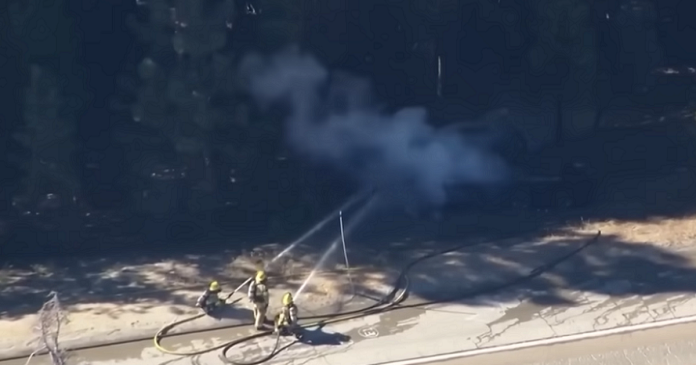Early Monday morning, a Tesla Semi truck fire led to the full closure of Interstate 80 near Nyack in Placer County, California. The all-electric truck, which was not towing a trailer and was registered to Tesla, veered off the eastbound lanes, crashing into nearby trees. The incident, which occurred near the Laing Road exit, caused significant disruptions but, fortunately, resulted in no injuries.
California Highway Patrol (CHP) and Cal Fire responded quickly to the scene, with fire crews receiving the emergency call shortly after 3 a.m. According to Cal Fire, controlling the blaze required “thousands – many thousands” of gallons of water. Firefighting efforts included a Cal Fire aircraft that dropped fire retardant to prevent the fire from spreading to the surrounding brush. The fire was eventually contained to the shoulder of the highway.
However, the incident revealed significant challenges in managing fires involving electric vehicles, particularly those powered by lithium-ion batteries. As these batteries degrade during a fire, they can reignite and burn at extremely high temperatures, further complicating firefighting efforts. The intense heat, which can exceed 1,000 degrees Fahrenheit, forced authorities to keep the interstate closed for nearly 16 hours, reopening the westbound lanes at 4:30 p.m. and the eastbound lanes after 7 p.m.
Ryan Woessner, Cal Fire Division Chief, noted that the closure was necessary to protect the public from toxic fumes released by the burning batteries. This event has underscored the ongoing need for specialized training and protocols for first responders dealing with electric vehicle fires.
This is not the first time a battery electric truck has caught fire. Last year, a similar incident occurred at Nikola’s Arizona headquarters, where an electric truck fire, caused by a coolant leak inside a battery pack, reignited a month later. These incidents highlight the need for continued innovation and safety measures as electric trucks become more common on the roads.
Tesla, which has been slowly rolling out its Semi trucks, plans to begin more extensive deliveries by late 2025, with external customers starting in 2026. Despite these challenges, companies like NFI have already begun testing Tesla Semis, exploring more sustainable transportation solutions.
The fire serves as a stark reminder of the complexities and risks associated with new electric truck technologies, emphasizing the need for continued vigilance and adaptation as the industry evolves.
Read more :














